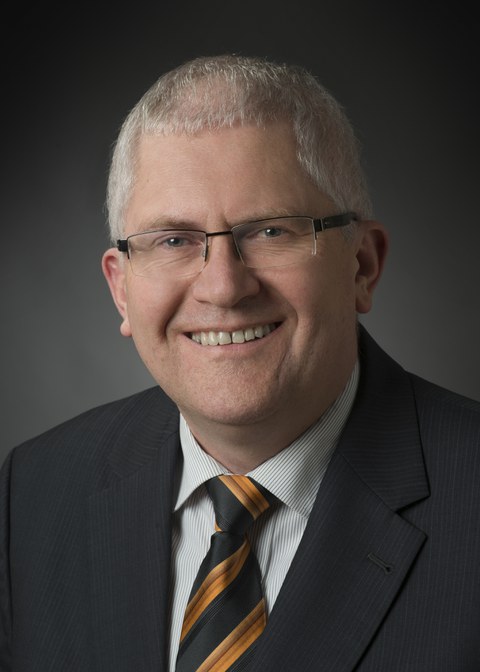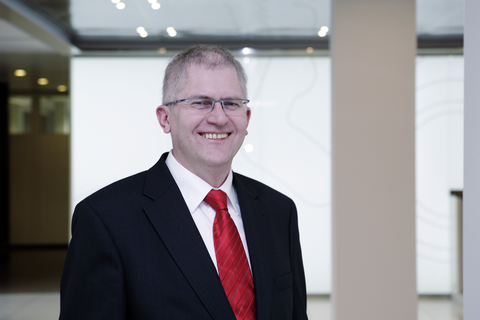Lehrstuhlinhaber
Prof Juergen Czarske grew up on a small farm with 20 hectares (200,000 m2) and the path seemed clear, but academic success and early hobbies in physics, chemistry and electronics changed his perspectives. After graduating from high school with advanced courses in electrical engineering and physics, he was the first in the whole family to go to university. Supported by the Siemens scholarship, he was able to study physics in addition to electrical engineering. He received his doctorate in laser measurement technology in 1995 and received the Venia Legendi for measurement systems from Leibniz University in 2003. From 1986 to 1991 he worked as a scholarship holder of Siemens AG in their research and development laboratories in Munich. From 1991 to 1996 he was assistant to the professor at Leibniz University. From 1995 to 2004 he was responsible for the development of measurement technology as a postdoc, group leader and later department head at the Laserzentrum Hannover (LZH e.V.). From 1996 to 2001 he conducted research as a visiting scientist in Japan (NTT) and the USA (MIT, Bell Labs, Stanford, Virginia Tech, NASA, CalTech); short-term missions were carried out. Since 2004 he has been a C4 professor at the TU Dresden. Juergen has been director of the Institute of Circuits and Systems since January 2016. Since 2019 he has been director of the BIOLAS Center and since 2023 head of the "Smart Fiber Communication Systems" group with a focus on physical layer security, digitally programmed spatial multiplexing, AI-based mode decomposition, physical layer security, and quantum communication with entangled photons. The aim is to achieve an advancement for the Internet through mode multiplexing in order to carry out secure high-data-rate transmissions through scattering media like multimode fibers.
His awards include the AHMT Measurement Technology Award 1996 (Munich), an international Berthold Leibinger Innovation Award 2008 of Trumpf, a Reinhart Koselleck Project of the German Science Foundation (DFG) 2014 & 2025 and the Joseph Fraunhofer Prize 2019 and the Robert M. Burley Prize of the Optical Society (OPTICA/OSA, Washington D.C.) in recognition of research achievements in optical engineering with commercialization and research breakthroughs with impact. Juergen is editor of several journals like Light Science and Applications, Advanced Photonics and Light Advanced Manufacturing, elected member of the Saxon Academy of Sciences in Leipzig, the Scientific Society for Laser Technology (WLT), and elected Vice President of International Commission for Optics (ICO). Juergen was a board member of the German Society for Applied Optics (DGaO) and Member of Review Board of DFG (German Science Foundation). He is an advisor to the German Society for Laser Anemometry (GALA) and the Student Chapter Dresden of SPIE (Washington) and OPTICA (Washington D.C.). Juergen has given over 1000 lectures and papers, including over 250 articles in peer-reviewed journals, over 150 guest lectures, and holds over 30 patents. Juergen is a Life Fellow of OSA and SPIE, a Fellow of EOS, IET, and IoP, and a Senior Member of IEEE. He is a full member of the Fraunhofer Society. Together with his staff and students, he has developed the MST laboratory into an internationally renowned facility for computational laser systems. More than 100 scientific prizes and awards have been given to students and staff of the MST/Czarske laboratory.
CV of Prof. Dr. Juergen Czarske
Prof. Czarske is the inaugural recipient of the 2020 Laser Instrumentation Award from the IEEE Photonics Society and 2022 Chandra S Vikram Award in Optical Metrology of SPIE, awarded in San Diego.
Listenzugehörigkeit: Hochschullehrende
Institut für Grundlagen der Elektrotechnik und Elektronik
Direktor des Kompetenzzentrums BIOLAS, Professur Mess- und Sensorsystemtechnik, Fakultät Elektrotechnik und Informationstechnik
Meine Person
Nach der Promotion und Habilitation hat er den Ruf der TU Dresden angenommen und die Professur für Mess- und Sensorsystemtechnik aufgebaut. Prof. Czarske ist Direktor des Kompetenzzentrums Biomedical Computational Laser Systems (BIOLAS) und co-optierter Professor in der Fakultät Physik. Prof. Czarske führte 6 Jahre ein Reinhart Koselleck-Projekt durch, das es Wissenschaftlern mit besonderen wissenschaftlichen Leistungen ermöglicht, zu hoch innovativen Projektthemen zu forschen. Er ist Mitglied der Sächsischen Akademie der Wissenschaften. Zu seinen Auszeichnungen zählen der 1996-AHMT-Messtechnikpreis (München), der 2008-Berthold Leibinger Innovationspreis (Ditzingen), der 2019-OSA Joseph Fraunhofer Award 2019/Robert M. Burley Prize (Washington, D.C.) und der 2020-Laser Instrumentation Award der IEEE Photonics Society (New York City).
Meine Motivation
Als Mitglied des Senats, des Fakultätsrats, des Promotionsausschusses und der Studienkommission hat sich Prof. Czarske vielfältig in Forschung, Transfer, Studium und Lehre eingebracht. Er setzt sich für die Weiterentwicklung der Fakultät unter besonderer Berücksichtigung der Förderung des Nachwuchses als auch der Einbindung von Senior-Mitgliedern ein. Senior-Mitglieder sollten als Erfahrungsträger verstärkt einbezogen werden. Für Studierende wurde der mit 10 000 Euro dotierte jährliche Preis der Gisela und Erwin-Sick-Stiftung initiiert. Über 80 Preise und Ehrungen haben die Studierenden und Mitglieder seines Lehrstuhls erhalten. Prof. Czarske setzt sich dafür ein, dass die Fakultät die Ausrichtung zur Biomedizinischen Technik weiter ausbaut.
Meine Ziele
Die Einbeziehung der Erfahrung von Senior-Professoren ist für die Internationalisierung der TUD von großer Wichtigkeit. Es wurde ein Student Chapter gegründet, wodurch auch ein Mentoring der Senior-Professuren für den Nachwuchs eingebracht werden kann. Die Kontakte des Student Chapters in viele Länder sollen auch in die Fakultätsarbeit eingebracht werden.
Kontakt
Sie können mich gerne unter der Durchwahl 34803 kontaktieren oder per E-Mail an
https://www.dgao.de/de/content/prof-jürgen-czarske-washington-geehrt
https://www.osa.org/en-us/history/biographies/bios/juergen_w_czarske/
- Sun, J., …, Czarske, JW, AI-driven projection tomography with multicore fibre-optic cell rotation. Nature Communications 15, 147 (2024)
- S. Rothe, …, JW Czarske, “Securing Data in Multimode Fibers by Exploiting Mode-Dependent Light Propagation Effects”, Research, https://doi.org/10.34133/research.0065 (2023)
- J. Wu, …, J. Czarske, …, "Learned end-toend high-resolution lensless fiber imaging towards real-time cancer diagnosis," Sci Rep 12(1), 18846 (2022).
- Qian Zhang, …, Juergen Czarske, "Learning the matrix of few-mode fibers for high-fidelity spatial mode transmission", APL Photonics, (2022)
- Jiawei Sun, …, Jürgen Czarske, “Quantitative phase imaging through an ultra-thin lensless fiber endoscope”, Light: Science and Applications of Nature Publishing (2022)
- Schmieder, F., …, Czarske, J., “Tracking connectivity maps in human stem cell–derived neuronal networks by holographic optogenetics”, Life Sci. Alliance 5, e202101268 (2022).
- Azaam Aziz, …, J.W. Czarske and Oliver G. Schmidt, “Real-time IR tracking of single reflective micromotors through scattering tissues,” Advanced Functional Materials (2019)


